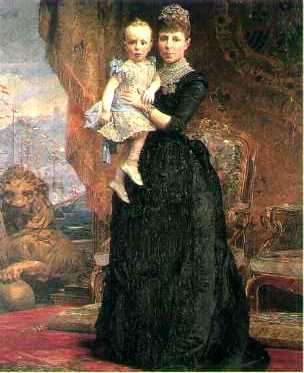

Queen Maria Cristina was the regent for King Alfonso XIII, and ruled Spain during the era of the Spanish American War.
BIOGRAPHY:
 Maria
Cristina de Habsburgo-Lorena, daughter of the Archduke Karl Ferdinand,
(cousin of the Austrian Emperor Francis Joseph), and his wife Elizabeth.
Maria Cristina was abbess of the Noble Ladies of Saint Theresa when, because
of her virtues, intelligence and elegant education, she was selected as
second wife of the King Alfonso XII. They were married in 1879. When the
king passed away in 1885, Maria Cristina was appointed Regent and, because
she was pregnant and the king's two children were females, no successor
to the crown was nominated until the birth of their child, a son. Therefore,
Alfonso XIII was king from birth and, until he came of age, (May 17, 1902),
his mother exercised the regency.
Maria
Cristina de Habsburgo-Lorena, daughter of the Archduke Karl Ferdinand,
(cousin of the Austrian Emperor Francis Joseph), and his wife Elizabeth.
Maria Cristina was abbess of the Noble Ladies of Saint Theresa when, because
of her virtues, intelligence and elegant education, she was selected as
second wife of the King Alfonso XII. They were married in 1879. When the
king passed away in 1885, Maria Cristina was appointed Regent and, because
she was pregnant and the king's two children were females, no successor
to the crown was nominated until the birth of their child, a son. Therefore,
Alfonso XIII was king from birth and, until he came of age, (May 17, 1902),
his mother exercised the regency.
This period, from the political point of view, was characterized, by constant switching of terms in office by the liberal and conservative political parties. It was also necessary for the regent to face a new insurrection in Cuba as well as in the Philippines. After the US intervention in favor of the insurgents, and the defeat of the Spanish Navy in Santiago and Cavite/Manila Bay, Cuba, Puerto Rico and Philippines were separated from the control of the Spanish crown, (Paris Treaty, 1898).
The failure of former Prime Minister Canovas' ultraconservative policy was visible even inside Spain. The new attitude of the liberal party, announced by new Prime Minister Sagasta and concreted by Moret by conceding autonomy to the colonies, reflected an anxiety that had been incubated for several months. This had been stated very frankly and radically in confidential remarks that were made by the Queen to the French Ambassador on April 28, 1897. Maria Cristina had not been dazzled by the optimistic telegrams received from Cuban Governor-General Weyler, stating that he "tricks his country in order to eternalize a war from which he lives on." Her views on the diasterous effects of Canovas' policy were reflected in her comments that Weyler and Canovas were "the two more pernicious men of this country."
The Queen Regent, exhausting her efforts to avoid the war against the US, believed, like the French Ambassador, that the war against the United States was the last resort for saving the national honor and, perhaps, the throne, should the Antilles be lost. One last time the Regent tried, without success, to obtain outside support, following Reverseaux: "Having Her Majesty insinuate that she placed her hopes on the support of Russia and France, (she was told), that she should only count on her own Spanish forces, without concreting in an useful way the sincere sympathies of France". The same was given to Moret on October 10, 1897.
During the regency of Maria Cristina, a wavering policy was used for facing the problems in Morocco during the first war of Melilla, (1893). Also, by agreement with France, the borders of the Spanish Continental Guinea were established, (1900). The regent was always highly esteemed because of her great discretion and tact and, after her son came of age, she devoted herself exclusively to family life and good works.

